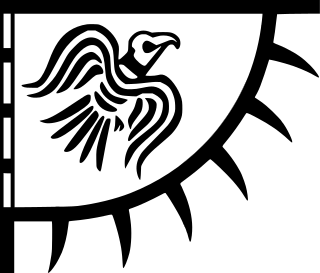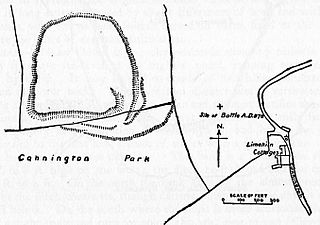Related Research Articles

Alfred the Great was King of the West Saxons from 871 to 886, and King of the Anglo-Saxons from 886 until his death in 899. He was the youngest son of King Æthelwulf and his first wife Osburh, who both died when Alfred was young. Three of Alfred's brothers, Æthelbald, Æthelberht and Æthelred, reigned in turn before him. Under Alfred's rule, considerable administrative and military reforms were introduced, prompting lasting change in England.

Year 878 (DCCCLXXVIII) was a common year starting on Wednesday of the Julian calendar.

The Danelaw was the part of England in which the laws of the Danes held sway and dominated those of the Anglo-Saxons. The Danelaw contrasts with the West Saxon law and the Mercian law. The term is first recorded in the early 11th century as Dena lage. The areas that constituted the Danelaw lie in northern and eastern England, long occupied by Danes and other Norsemen.
Guthrum was King of East Anglia in the late 9th century. Originally a native of Denmark, he was one of the leaders of the "Great Summer Army" that arrived in Reading during April 871 to join forces with the Great Heathen Army, whose intentions were to conquer the kingdoms of Anglo-Saxon England. The combined armies were successful in conquering the kingdoms of East Anglia, Mercia, and Northumbria, and overran Alfred the Great's Wessex, but were ultimately defeated by Alfred at the Battle of Edington in 878. The Danes retreated to their stronghold, where Alfred laid siege and eventually Guthrum surrendered.

At the Battle of Edington, an army of the kingdom of Wessex under Alfred the Great defeated the Great Heathen Army led by the Dane Guthrum on a date between 6 and 12 May 878, resulting in the Treaty of Wedmore later the same year. Primary sources locate the battle at "Eðandun". Until a scholarly consensus linked the battle site with the present-day village of Edington in Wiltshire, it was known as the Battle of Ethandun. This name continues to be used.
The Treaty of Wedmore is a 9th-century accord between Alfred the Great of Wessex and the Viking king Guthrum the Old. The only contemporary reference to this treaty, is that of a Welsh monk Asser in his biography of Alfred,. In it Asser describes how after Guthrum's defeat at the Battle of Edington, followed by his surrender some days later, he agreed to a peace treaty with Alfred. The treaty was conditional on Guthrum's being baptised, and also Guthrum and his army leaving Wessex.

The Battle of Cynwit, was a battle between West Saxons and Vikings in 878 at a fort which Asser calls Cynwit. The location of the battle is not known for sure but probably was at Countisbury Hill, near Countisbury, Devon.

The Great Heathen Army, also known as the Viking Great Army, was a coalition of Scandinavian warriors who invaded England in AD 865. Since the late 8th century, the Vikings had been engaging in raids on centres of wealth, such as monasteries. The Great Heathen Army was much larger and aimed to conquer and occupy the four kingdoms of East Anglia, Northumbria, Mercia and Wessex.

The Last Kingdom is the first historical novel in The Saxon Stories by Bernard Cornwell, published in 2004. This story introduces Uhtred of Bebbanburg, a Saxon noble who is kidnapped by Danish Vikings as a young child and is assimilated into their culture, religion and language before a series of events lead him into the service of King Alfred of Wessex and his participation in multiple battles, including the notable Battle of Cynwit before the book's conclusion.

The Pale Horseman is the second historical novel in the Saxon Stories by Bernard Cornwell, published in 2005. It is set in 9th century Wessex and Cornwall.

Ubba was a 9th-century Viking and one of the commanders of the Great Heathen Army that invaded Anglo-Saxon England in the 860s. The Great Army appears to have been a coalition of warbands drawn from Scandinavia, Ireland, the Irish Sea region and Continental Europe. There is reason to suspect that a proportion of the Viking forces specifically originated in Frisia, where some Viking commanders are known to have held fiefdoms on behalf of the Franks. Some sources describe Ubba as dux of the Frisians, which could be evidence that he also associated with a Frisian benefice.

The ancient Selwood Forest ran approximately between Gillingham in Dorset and Chippenham in Wiltshire. It is described by the historian Barbara Yorke as a "formidable natural obstacle" in the Anglo-Saxon period, which was a significant boundary between east and west Wessex. It may earlier have been a negotiated frontier between Wessex and the British kingdom of Dumnonia which was important in the later development of the West Saxon shires, and later boundaries between Wiltshire and Somerset and north Dorset run through the forest. The boundaries through the forest and Bokerley Dyke which separated Somerset and Dorset from eastern counties may date to the fifth or sixth centuries. Selwood's importance as a boundary was also recognised in 705 when the bishopric of Sherborne was established for those "west of Selwood".

Donyarth or Dungarth was the last recorded king of Cornwall. He was probably an under-king, paying tribute to the West Saxons.

Odda of Deerhurst was an Anglo-Saxon nobleman active in the period from 1013 onwards. He became a leading magnate in 1051, following the exile of Godwin, Earl of Wessex and his sons and the confiscation of their property and earldoms, when King Edward the Confessor appointed Odda as earl over a portion of the vacated territory. Earl Godwin was later restored to royal favour, and his lands returned, while Odda received a new earldom in the west midlands in compensation. Odda became a monk late in life. He was buried at Pershore Abbey.
Key dates in the History of Somerset
Events from the 9th century in England.
The Ealdorman of Devon in England before the Norman Conquest of 1066, was the Ealdorman, that is the king's deputy as local ruler, of the shire of Devon. Following the Norman Conquest the office was re-invented, if not actually continued, as Earl of Devon.

Wulfhere was Ealdorman for Wiltshire, when the Anglo-Saxon kingdoms, of England, were experiencing turbulent times. An invading Danish army had landed in East Anglia, in 865 and had conquered all of the English kingdoms apart from Wessex. The Danish king Guthrum was overrunning the kingdom of Wessex, with Alfred the king of Wessex in retreat. The county of Wiltshire was part of Wessex and on its northern border was Danish held Mercia. Wulfhere was left with a problem, should he stay loyal to his king (Alfred) or do a deal with the invader? The evidence from the charters of the time infer that Wulfhere had some sort of arrangement with Guthrum. So when Alfred was able to regain control of his kingdom Wulfhere was held to account.
The Battle of Chippenham was a January 878 battle between a Viking army led by Guthrum and an Anglo-Saxon army led by Alfred the Great. The Vikings forced Alfred to flee Chippenham and managed temporarily to gain control over most of Wessex.
The Battle of Benfleet was an 894 battle between the Vikings and the Anglo-Saxons commanded by Edward the Elder and Æthelred, Lord of the Mercians, the son and son-in-law of Alfred the Great respectively. The battle was part of a campaign started by the Vikings in 892 to raid and potentially occupy lands in England, having been defeated by the armies of France. As part of this campaign the invaders were supported by those Vikings who had settled in England following an earlier invasion launched in 865. The battle was a victory for the Anglo-Saxons who successfully captured a number of women and children, as well as capturing or destroying the Viking ships.
References
Citations
- 1 2 3 Harding p. 6
- 1 2 Fisher p. 539
- ↑ Savage p. 101
- ↑ The Anglo-Saxon Chronicle Freely licensed version at Gutenberg Project. Note: This electronic edition is a collation of material from nine diverse extant versions of the Chronicle. It contains primarily the translation of Rev. James Ingram, as published in the Everyman edition.
- 1 2 Plummer 1911.
- ↑ Albert and Tucker p. 3
- 1 2 3 Albert and Tucker p. 4
- ↑ Swanton p. 78
- 1 2 3 Kendrick p. 238
- ↑ Simon Kunz at IMDb
Bibliography
- Albert, Edoardo; Tucker, Katie (2014). In Search of Alfred the Great. Stroud: Amberley Publishing. ISBN 978-1-44563-906-2.
- Fisher, George (1832). A Genealogical Companion and Key to the History of England. London: Simpkin and Marshall. p. 539.
- Harding, William (1845). The History of Tiverton, in the County of Devon. Vol. Book 2. Tiverton: F. Boyce.
- Savage, Anne (1988). Anglo-Saxon Chronicles. Papermac. ISBN 0-333-48881-4.
- Swanton, Michael (1998). The Anglo-Saxon Chronicle. Psychology Press. ISBN 978-0-415-92129-9.
- Kendrick, T. D. (2004). A History of the Vikings. Courier Dover Publications. ISBN 978-0-486-43396-7.
Attribution
- This article incorporates text from a publication now in the public domain : Plummer, Charles (1911). "Alfred the Great". In Chisholm, Hugh (ed.). Encyclopædia Britannica (11th ed.). Cambridge University Press.